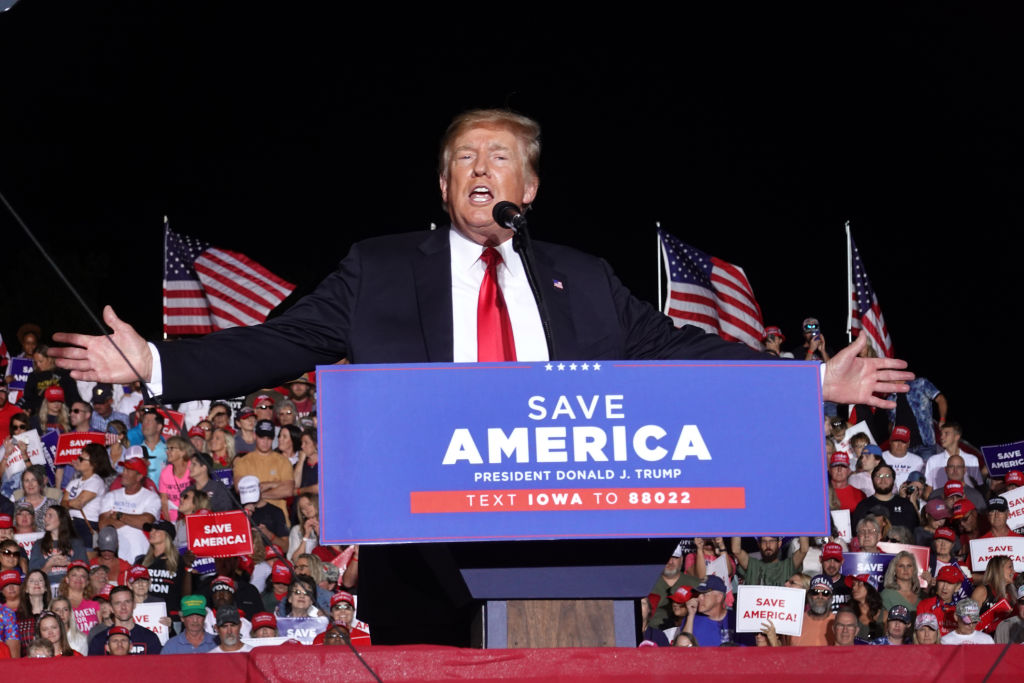Enough is enough. Yes, there were problems with last November’s election, but they have been litigated and audited for months. We know the outcome. To continue questioning those reviews and continue challenging the election outcome does lasting damage to our country. It’s long past time to stop.
It is perfectly proper for candidates to demand recounts, audits and judicial review, as former president Donald Trump has done. We need those safeguards to assure the public, especially those who voted for the putative loser, that the winner holds office legitimately. In the days and weeks after the vote, as those challenges move forward, the candidates have a responsibility. They need to be clear that they are coloring inside the lines. They should emphasize that they are following established procedures for their challenges and, most important of all, that they will respect the decision.
That is not what Donald Trump has done. Since November 3, he has consistently argued that the election was stolen from him and that Joe Biden is not his legitimate successor. In the months after the election, Trump repeatedly pressured the Department of Justice to pursue his challenges, even after its attorneys had determined they lacked merit. His senior political appointees, including the attorney general and later the acting attorney general, agreed with those professional assessments and rebuffed his pressure. They should never have been put in that position.
In early January, when Congress met to accept the states’ certified vote counts and formally elect the new president, President Trump demanded that his vice president and congressional allies postpone that certification and election. At the same time, he urged his most ardent followers to come to Washington on January 6 to protest the congressional action — though there is no evidence he was involved in the assault on the Capitol building itself, as many Democrats and some anti-Trump Republicans have charged.
What gives this old story fresh air is that Trump has persevered with his challenge to the election results. His mass email last week didn’t quite say the election was “stolen,” but it came close. What he said to millions of followers was this:
“The 2020 Election was filled with errors, irregularities, and scandal. The Radical Left knows it, the media knows it, and the Patriots of our Country know it, and now the USA is paying a big price — it is very sad.
“A new poll says that 56 percent of voters believe that there was CHEATING (his caps).”
The letter comes from “President Donald J. Trump.”
There are several crucial points to remember here. The first is that Trump’s attack on our constitutional procedures does not stand alone. The Democrats have waged their own damaging assault on several fronts. They floated the idea of adding two new states to the Union because they are reliable Democratic voters. They have repeatedly suggested adding more Justices to the Supreme Court because the court currently has a conservative majority. Both are efforts to fundamentally change the legislative and judicial branches by packing them with supporters. The White House and its congressional allies dropped those initiatives only because voters so reviled them. Democrats still threaten to eliminate the Senate’s filibuster rule, which would destroy the Senate’s role as a forum for debate and compromise and turn it into a clone of the House. Again, they want to change enduring institutions for short-term advantage.
Like Trump, they have been none-too-keen to accept the legitimacy of popular votes they lost (or might lose). Before the November vote, Hillary Clinton told a televised interview, “Joe Biden should not concede under any circumstances, because I think this is going to drag out, and eventually I do believe he will win if we don’t give an inch, and if we are as focused and relentless as the other side is.” What Trump has done is follow Hillary’s advice.
This bipartisan attack on the legitimacy of presidential elections contrasts sharply with the 2000 contest between Al Gore and George W. Bush, which ultimately required a Supreme Court decision. Once that decision was rendered, however, Gore and his supporters accepted the final count in Florida, which decided the election, and let the matter drop. Richard Nixon conceded defeat on election night in 1960, even though he had a very strong case that he lost only because of cheating by the Daley machine in Chicago and Lyndon B. Johnson’s allies in Texas. Yet neither Nixon nor Gore continued their complaints into the new administration or challenged the legitimacy of the new president. Those days are gone, and our republic suffers for it.
Leaving behind these challenges to the November outcome does not mean tepid acceptance of our current, flawed election arrangements. There is a legitimate fight between Democrats, who argue that state-level changes in voting laws will disenfranchise valid voters, and Republicans, who think that some changes, such as voter ID laws, will decrease fraud. There is a strong need to ensure vote-by-mail procedures, which are now widespread, are conducted fairly. There is a legitimate fight about the manifest bias of mainstream media (permitted, of course, by the First Amendment) and the problematic ability of Big Tech social media to block political views they oppose. The most egregious example of Big Tech’s malign influence was the suppression of the New York Post’s stories about Biden family corruption. The public was largely blocked from seeing these reports in the country’s fourth-largest newspaper in the weeks leading up to the November election.
The media and Big Tech have chosen to act as political partisans, and the public knows it. Polls show trust in them has evaporated, and rightly so. Still, they did manage to elect their favored candidate. Their justification is the same as that of Senate Majority Leader Harry Reid, who (before the 2012 election) falsely claimed that Republican presidential candidate Mitt Romney had not paid any taxes in a decade. In fact, Romney had paid millions. After the election, Reid was asked if he regretted the lie. His reply to the television interviewer was simply, “Romney didn’t win, did he?”
We saw lies like these surrounding the Russia Collusion Hoax, which first sought deny Trump victory in 2016 and then crippled his presidency for several years, all based on flimsy allegations, quickly disproven by the FBI, that had been generated and circulated by the Hillary Clinton campaign. Five years later, we still await a legal reckoning from Special Counsel John Durham. Justice delayed is justice denied.
Politicians like Harry Reid, Hillary Clinton and Donald Trump wage attacks like these for tactical advantage. Alas, what is tactical advantage for them inflicts real structure damage on our democracy.

























